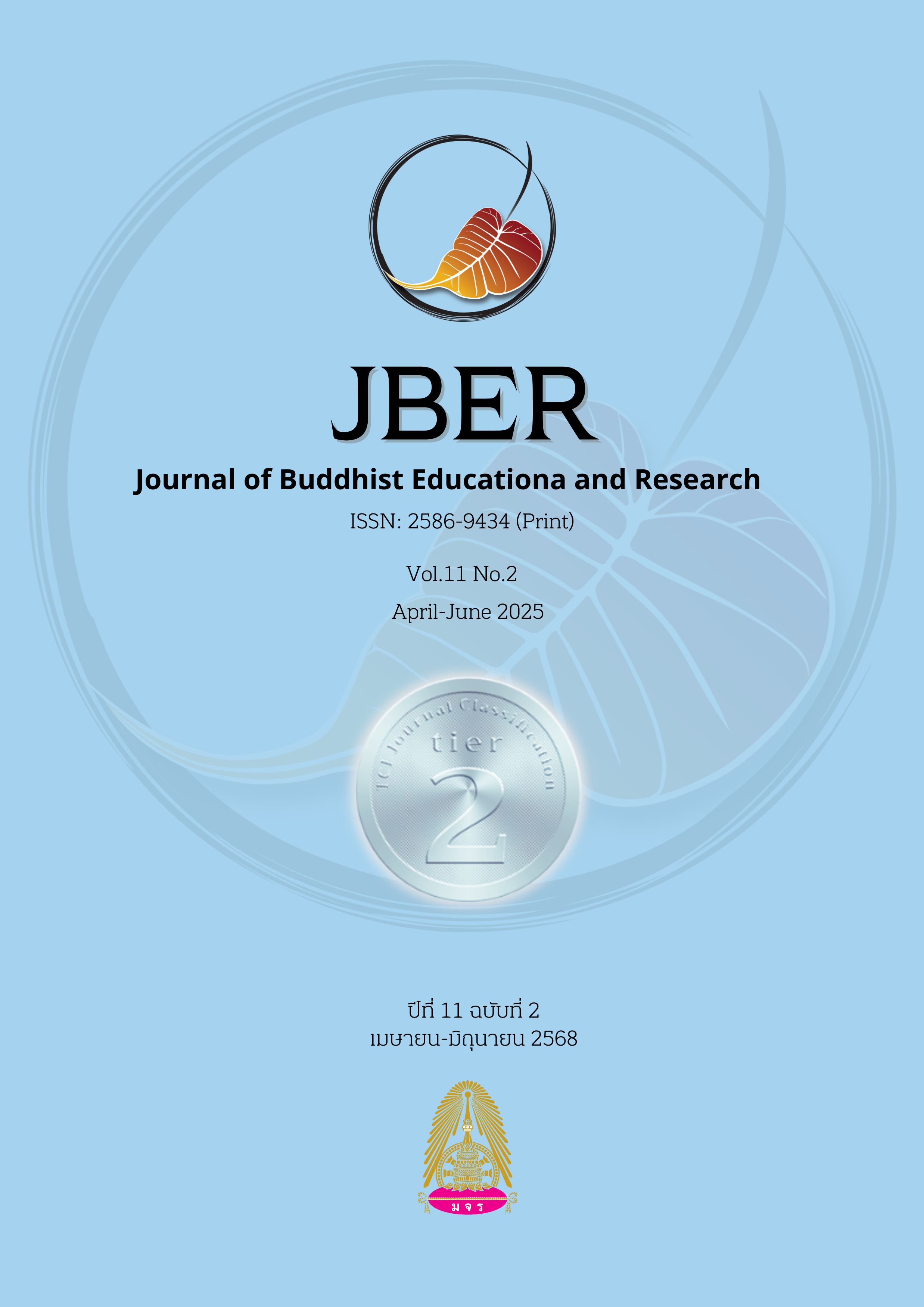The Transformational Leadership Model According to the Four Brahmavihāra of Charity School Administrators of Buddhist Temples, Northeast Region 3
Keywords:
Model, Leadership, Four BrahmavihāraAbstract
The objectives of this research were: 1) to study the current conditions, the desired conditions, and necessary needs of transformative leadership according to the Four Brahmavihāra of charity school administrators of Buddhist Temples in the Northeast Region 3; 2) to develop the model of transformative leadership according to the Four Brahmavihāra of charity school administrators of Buddhist Temples in the Northeast Region 3; 3) to assess the model of transformative leadership according to the Four Brahmavihāra of charity school administrators of Buddhist Temples in the Northeast Region 3. This study was carried out by means of mixed-method research: quantitative and qualitative research. The research tools consisted of a questionnaire, a semi-structured interview form, and an assessment form of suitability, possibility, and usefulness. For quantitative research, the sample group included 244 school administrators and teachers. Statistics used were: frequency (f), percentage (%), mean, standard deviation (S.D), and Modified Priority Need Index (PNImodified) with the present condition value of 0.993 and the desired condition value of 0.992. For qualitative research, the group of informants was: (1) five experts selected by purposive sampling used in checking the congruence and validity of the content;(2) five experts selected by purposive sampling used in semi-structured interviews; (3) nine experts by purposive sampling used in Focus Group Discussion; (4) six experts and stakeholders of 3 Charity Schools of Buddhist temples in the Northeast Region 3 with an excellent performance by selecting one administrator, five teachers from each school, totaling 24 persons, to assess of the model on suitability, possibility, and usefulness presented in the dissertation’s public hearing to conclude as a result of the research. The research results were as follows: 1. From the study of the current conditions, the desired conditions and necessary needs of transformative leadership according to the Four Brahmavihāra of charity school administrators of Buddhist Temples in the Northeast Region 3, the mean value of the desirable conditions was higher than the present condition in all aspects and all issues. Overall, the current conditions were at a high level. The desirable conditions were at the highest level. To prioritize urgent needs that need to be developed first considering the PNImodified, the results were as follows: (1) individual consideration according to the Four Brahmavihāra; (2) intellectual stimulation according to the Four Brahmavihāra; (3) the inspirational creation aspect according to the Four Brahmavihāra; (4) the influence with ideology according to the Four Brahmavihāra. 2. The results of the development suggested that the transformational leadership model according to the Four Brahmavihāra of charity school administrators of Buddhist temples in the Northeast Region 3 should consist of (1) name; (2) objectives; (3) principle and concept, (4) content (principles and concepts, objectives, contents, integration according to the Four Brahmavihāra, expected outcomes of each component). 3. The assessment results of the development suggested that the transformational leadership model according to the Four Brahmavihāra of charity school administrators of Buddhist temples in the Northeast Region 3 suggested that its overall suitability, possibility, and usefulness were at the highest level. The possibility and usefulness were at a high level and all issues can be used for real development.
References
กระทรวงศึกษาธิการ. (2562). แผนพัฒนาการศึกษากระทรวงศึกษาธิการ. โรงพิมพ์คุรุสภาลาดพร้าว.
กฤษณา ศักดิ์ศรี. (2534). องค์การกับมนุษย์กับมนุษยสัมพันธ์. อักษรวิทยา.
แก้ว ชิดตะขบ. (2547). รวมวิชาธรรมศึกษา ชั้นตรี ตามหลักสูตรสนามหลวงแผนกธรรม พ.ศ. 2547. โรงพิมพ์ศาสนา.
จิรวรรณ จันทร์ปรางค์. (2560). ความต้องการพัฒนาตนเอง. มหาวิทยาลัยรามคำแหง.
ชัยเสฏฐ์ พรหมศรี. (2563). หนังสือภาวะผู้นำสำหรับผู้บริหารองค์การ: แนวคิด ทฤษฎีและกรณีศึกษา. สำนักพิมพ์ปัญญาชน.
ถวัลย์ โพธิประสาท. (2560). ยุทธศาสตร์การพัฒนาสถานศึกษาทั้งระบบ. สำนักงานคณะกรรมการการศึกษาแห่งชาติ.
ทิศนา แขมมณี. (2553). ศาสตร์การสอน: องค์ความรู้เพื่อการจัดกระบวนการเรียนรู้ที่มีประสิทธิภาพ (พิมพ์ครั้งที่ 13). สำนักพิมพ์แห่งจุฬาลงกรณ์มหาวิทยาลัย.
ธีระ รุญเจริญ. (2550). ความเป็นมืออาชีพในการจัดการและบริหารการศึกษายุคปฏิรูปการศึกษา. บริษัท แอล.พี.เพรส.จำกัด.
ธุรกิจ สัมมารธนิธย์. (2556). หลักทฤษฏีและปฏิบัติการบริหารการศึกษา. สำนักพิมพ์ข้าวฟ่าง.
นิตย์ สัมมาพันธ์. (2529). การบริหารเชิงพุทธ. โอ.เอส. พลิ้นติ้งเฮ้าส์.
เนตร์พัณณา ยาวิราช. (2550). ภาวะผู้นำและผู้บริหารเชิงกลยุทธ์ (พิมพ์ครั้งที่ 5). เซ็นทรัลเอ๊กเพรส.
บุญชม ศรีสะอาด. (2545). การวิจัยทางการวัดผลและประเมินผล. สุวีริยาสาส์น.
บุญมี แท่นแก้ว. (2539). จริยศาสตร์. โอเดียนสโตร์.
ปรียาพร วงศ์อนุตรโรจน์. (2555). การบริหารงานวิชาการ. ศูนย์สื่อเสริมกรุงเทพ.
ปัญญา นันทภิกขุ ปั่น ปญฺานนฺโท. (2541). หน้าที่ของคน ฉบับสมบูรณ์. ธรรมสภา.
ปัณรส มาลากุล ณ อยุธยา. (2553). การบริหารการเปลี่ยนแปลง: ประเด็นยุทธศาสตร์ขององค์การภาครัฐในยุคปัจจุบัน (พิมพ์ครั้งที่ 1). จุฬาลงกรณ์มหาวิทยาลัย.
พระธรรมกิตติวงศ์ (ทองดี สุรเตโช). (2541). พระในบ้าน. คาธาวรรณการพิมพ์.
พระพรหมคุณาภรณ์ (ป.อ. ปยุตฺโต). (2551). พจนานุกรมพุทธศาสตร์ ฉบับประมวลธรรม (พิมพ์ครั้งที่ 16). เอส.อาร์.พริ้นติ้งแมสโปรดักส์ จำกัด.
พระราชญาณวิสิฐ (เสริมชัย ชยฺมงฺคโล). (2552). หลักธรรมาภิบาลและประมุขศิลป์: คุณลักษณะความเป็นผู้บริหารที่ดี. มูลนิธิพุทธภาวนาวิชชาธรรมกายาราม.
พิสิฐ เจริญสุข. (2543). ปกิณกรรม. โรงพิมพ์การศาสนา.
Downloads
Published
How to Cite
Issue
Section
License
Copyright (c) 2025 Journal of Buddhist Education and Research (JBER)

This work is licensed under a Creative Commons Attribution-NonCommercial-NoDerivatives 4.0 International License.





